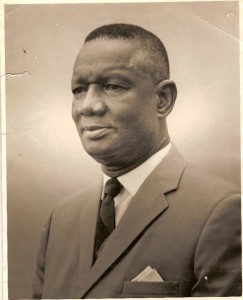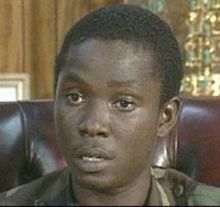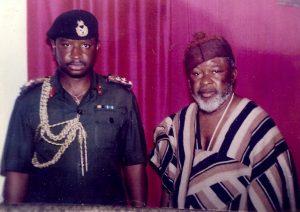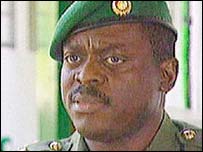Whenever I hear the cacophonous sounds of the bells of enmity, abhorrence and grudges being rang under the guise of patriotism against or for some Sierra Leonean political groupings, by authors I had mistakenly had in high esteem since I began freelancing several years ago, excruciating pains and perplexes runs down my spines for hours. As a result, like many levelheaded readers would resolve, I don’t visit their homepages anymore. The less significant but very topical one as elections draw nearer in Sierra Leone, is the issue of Ret. Brigadier Julius Maada Bio, the flag-bearer of the Sierra Leone Peoples Party (SLPP) – the country’s only healthy opposition, based on his individual participation in the 11 years unenviable era in our country’s history. Though I don’t hold any direct allegiance to SLPP or Maada Bio, but this piece is not intended to glorify any of those baseless pieces often authored against them. So my dearest reader, if you hate reading objective pieces that to certain extent respects your enemy, you better turn to another page. And as for those who usually chant “Bravo” to Critique Echo for its usual critical analyses in its uncompromising “critique column”, they are welcome to join me in this short but rugged journey of analyses of why the bygone should be bygone and the sleeping dog be left alone, in the following episodes:
The Government of Presidents Siaka Stevens and J. S. Momoh (Sheki-Momoh’s APC)
These two legendaries of bad governance succeeded in transforming Sierra Leone into the African version of the Hitler’s led “Third Reich” of Germany. 
The Sheki-Momoh’s APC regime eliminated countless number of opponents including inner circle members of their own cabal which included but not limited to Brigadier Bangura and colleagues who were executed on 29th June 1971, Dr. Fornah, Bash Taqi and others executed on 19th July 1975, Francis Minah, G.M.T Kai Kai and others executed on 7th October 1989 all based on allegations that were never proofed by any independent judiciary. In addition to that, that regime butchered countless number of innocent students and civil activists in the year 1977 for resisting its ideology. That was the regime that introduced the infamous slogan of “wusai you tie cow nar de ih de eat, or a cow grazes where its leashed” as justification for corruption; valued fowl’s life more than human’s by changing the acronym of the Internal Security Unit (ISU) to “I will Shoot U”; killed domestic animals at night and threw the blood at the central squire of Bo, Kenema and Freetown and turn round to arrest opposition candidates on the following day referring to them as cannibals, when the general public refuses to believe, a real human being would be kidnapped and eventually killed in order to justify the arrest; genuine murder cases twist-judged to become attempted murder, suspected murder, and the doer finally set free upon orders from the above; men like Ansuman Pujeh, J.B. Dauda, James Gendemeh, F. M Minah etc. were assigned with armed-guards with shoot and kill orders against innocent civilians who voiced “No” to them; jubilating opposition supporters were thrown into hollowing cry after their favorite candidates declared the looser of elections they had clearly won, by interchanging names and photographs on ballot boxes during transport from the provinces to Freetown; government operatives had drums of fuel and thousands of bags of staple food (rice) in their private homes while the ordinary taxpayer queued for it under the rains; the list is endless.
As far as we know, that is the regime that was terminated on Wednesday, 29th April 1992 by Valentine Strasser and comrades who formed the National Provisional Ruling Council (NPRC).
The NPRC
The Sheki-Momoh’s APC was based on a dictatorship constitution that was doctored by themselves with the objective of allowing no other party to exist except the APC. Unlike the NPRC, it was technically unconstitutional, but it had popular opinion of the nation, hence its system of governance was generally based on decrees. The Sierra Leonean populace preferred it to the Sheki-Momoh’s APC regime which is why they observed a two-day public holiday with the entire country jubilating after Joseph Saidu Momoh was exiled.

The NPRC like many other junta regimes in the world, was full of lawlessness and arbitrary justice but it also left some positive memories for the Sierra Leonean populace: a police force without Bambay Kamara could now be called “ a force for good”; a secret ballot without interchanging the candidates photographs on the boxes in order to declare the wrong candidate as the winner to the dismay of the voters followed by shooting and killing of innocent people could now be called “a democratic election”; a bag of rice purchased from the nearest Lebanese shop without queuing for it, no matter how much it cost, could now be seen as sign of accountable governance; a motorable road between Waterloo and Mile Siaka can also be called NPRC legacy .
I sometimes feel sick when I read interviews granted the expired Valentine Strasser by some news outlets I thought were credible. Strasser should know that he is a curse to our nation; he is the only former head of state in the world that failed to plan himself after complete four years in power. He served as the world youngest and stupidest head of state who couldn’t even tell what happened to his salaries during the period under review. Instead he is joining the long queue of the other rank soldiers to file cases for recuperation benefits to enable him drink more poyo in Kosso Town. Of course it’s quite understandable why he never speak in favor of Maada Bio in any of his interviews because Bio is the one that uprooted him after he failed to deliver the nation. In addition to that, Bio is physically fit, financially and educationally prosperous. What is more disheartening is the interviewer’s failure to ask him (Strasser) about the fact and circumstance of the APC politicians’ execution under his watchful eyes, if indeed this is a relevant issue to be discussed. Instead, they cast the stigma on Maada Bio in order to dent his image in the eyes of the general public. This type of campaign method is very cheap.
I don’t personally hold any allegiance to Maada Bio and his SLPP party but I still respect him for two unforgettable things he did during his short term as head of NPRC:

(2) Everyone will agree with me that the so called first democratic elections in our country’s history which took place on 26/27 February 1996 were flawed and fixed up as polling returns tripled number of registered voters in many regions. Most importantly, thousands of vigilantes, refugee fighters from neighboring Liberia (ULIMO) and the national army were all armed to the teeth which made it possible for Bio to have simply declared the elections null and void to retain power. One might say he was pressurized by the international community, but international pressures and sanctions are normal with every military regime.
Sadly enough, the Bio’s antagonists never mention these parts of the story in their antagonistic pieces.
The Armed Forces Revolutionary Council (AFRC)
Perhaps the act by Johnny Paul Koroma and comrades to overthrow the then government of President Ahmed Tejan Kabba on Sunday, 25th May 1997 was, to some extent, justifiable. 
The Nigerian-led ECOMOG troops backed by the Civil Defense Forces (CDF) carried out a bloody military intervention in February 1998, which brought back into power the civilian regime of President Ahmed Tejan Kabba. ECOMOG and the CDF automatically became the State Security of President Kabba’s reinstated regime. State House was being guarded by Kamajor fighters. President Kabbah himself was initiated in Poro and Kamajor in order to retain power even though he officially disassociated himself with it later in his struggle to avoid prosecution at the ICC.
A very unfair military court-martial presided over by Nigerians was immediately instituted against some of the soldiers who preferred to surrender instead of following the rebels into the jungle. As a result, 24 soldiers including highly educated officers were executed by firing squad carried out by Nigerians on 19th October 1998. I refer to this court-martial as unfair because it was conducted by Nigerians who already had grudges against the country’s national army. It was like trying a rebel in a Kamajor court.
The national army was well replaced by the Nigerians with the spearheader of the intervention, Colonel Mitikishi Maxwell Kobe decorated as Brigadier and Chief of Defense Staff of the state army. But the only difference between the Nigerians and the Sierra Leoneans was the badge “ECOMOG”. Unwarranted road blocks were being mounted to harass travelers for money, husbands were beaten and locked up for their legally wedded wives, drivers were forced to take on board their vehicles ECOMOG girlfriends without payment, relief personnel were harassed for humanitarian relief items, household properties were looted by security personnel. Yet the politicians said situation was under perfect control simply because they were riding luxurious jeeps with tinted classes thoroughly guarded by the Nigerians.
Certainly the only option for the AFRC was to come back and force their way into the city because the politicians relied on ECOMOG and CDF and ignored reconciliation with the junta referring to them as “renegades” of the national army. Whatever grudge the national army might have accumulated against the civilian administration of President Kabbah, however, wasn’t enough to justify the conflagration that engulfed Freetown. “Heroism is not to kill those you hate but to live with them” (Nelson Mandela).
Let the bygones be bygone, let the sleeping dog lie, for the sake of peace in Sierra Leone


Othman, a lot of effort would have gone into piecing together historical facts about a nation, spanning a number of decades. I know it is difficult to stay ‘objective’ especially when the narrative bears political connotations. What I found interesting is how you managed to present both the ‘good’ and ‘bad’ in all different regimes of post-colonial Sierra Leone, even for the Military Junta’s lead by Strasser, Maada and Johnny-Paul. Oh, except for the Sheki-Momoh era were you struggle to cite even an iota of goodness that can be attributed to Sheka Stevens or J S Momoh. For me, this kind of unbalanced an otherwise good article. Common, really, nothing……not even the scanty public infrastructure that other subsequent regimes are claiming credits for rehabilitating or reconstructing after the war? I agree with you on many count, including the fact that we hold Sheki accountable for ridging elections in favour of APC candidates in all elections under his reign. That being the case, we cannot then present Maada as the unfortunate bystander who just happened to be around when the ‘flawed and fixed-up’ elections of 1996 took place under his leadership. I know the circumstances were different but hey, that ‘goes with the territory’ as they say here. The buck stops with the leader. Thanks Othman for the effort. It is good to have these reflections sometimes ones history. This makes us who we are today and will be in future
Mr. Sheriff, its good idea to refresh people's memory about the horrible past of the APC under the supervision of Siaka Stevens and his bastard son Momoh. Some peole think because APC is in power now we should just forget entirely. That government was exactly as described it in this article. I will surely wait for the next publication as you promised.
God bless you, Abu